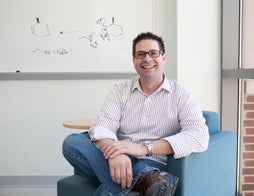Organic chemistry has a reputation. It’s the course that’s supposed to weed out the students who will reevaluate their career goals from those who will go on to be biochemists, surgeons, pediatricians, and so on.
Associate Professor of Chemistry and Biochemistry Justin Wyatt and two of his students offer tips on how to not just pass but excel in organic chemistry.
1. Learn to speak the language.
“It helps to think of it as a language,” Wyatt said. “You have to learn the alphabet and the words, then you can start to construct conversations.” The point is, according to Wyatt, that you have to be able to combine individual components of organic chemistry in different ways rather than just memorize the problems from the textbook.
2. In fact, don’t memorize anything.
Biochemistry major Carson Reed ’15 received an A in Wyatt’s class, and his best advice for organic chemistry students is not to memorize. “You just have to understand the concepts and be able to apply them in different concepts. Memorizing won’t get you there.”
3. Expect to spend 10 hours a week on this class.
“Going into Dr. Wyatt’s class I knew it would be difficult and time consuming,” biology major Amber Frazier ’14 said. “I would estimate that for every hour of lecture I spent two hours rewriting and re-learning what he taught on my own.” Frazier received a B in Wyatt’s class and an A- in the co-requisite lab.
4. Prepare to meet your best friends
Small study groups in a class like organic chemistry mean lots and lots of quality time with your classmates. “You should have three or four people in your study group,” Reed said. “Any more than that and it’s just a party. Then each person should learn a chapter well enough to teach it to the other students in the group. When you know the material well enough to teach it to someone else, you have truly mastered it.”
Frazier also works in study groups. “I join a study group about a week before the test and we meet and study every night until the test. We basically stay in the School of Sciences and Mathematics Building all night studying.”
5. Don’t let the course’s stigma intimidate you.
“So many students come into the class already thinking they’re going to fail, or worse, thinking the class is set up for them to fail – that it’s just a weed out course,” Wyatt said. “Really, organic chemistry teaches building blocks necessary to understand biochemistry. It’s an essential course for students interested in medical and biochemical fields, and it’s certainly passable for students who put in the effort.”
6. Take advantage of office hours.
“Dr. Wyatt hosted office hours three times a week when I was in his class, and I went one-to-two times a week,” Frazier said. “I found the one-on-one time with him more helpful than the lecture time because he could address my specific questions in depth.
Wyatt adds, “If you come to office hours, come with a specific question or few questions. Don’t just come in and say you don’t understand any of it. If you come with specific concepts to work on, we’ll get through them.”
For more information on organic chemistry, email Justin Wyatt at [email protected].





